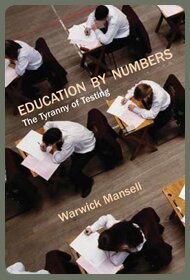Monday, October 26th
A collection of insightful views on the Cambridge Primary Review featured in last Friday’s TES letters column.
See: http://www.tes.co.uk/article.aspx?storycode=6025758
http://www.tes.co.uk/article.aspx?storycode=6025759
http://www.tes.co.uk/article.aspx?storycode=6025760
and: http://www.tes.co.uk/article.aspx?storycode=6025761
- Warwick Mansell
No Comments
posted on October 26th, 2009
Wednesday, October 21st
The Archbishop of Canterbury, Rowan Williams, attacked the school accountability system as “oppressive” and “mechanistic” today.
See: http://www.telegraph.co.uk/education/6398384/Archbishop-of-Canterbury-attacks-oppressive-education-system.html#
- Warwick Mansell
No Comments
posted on October 21st, 2009
Monday, October 19th
It was pleasing to see Education by Numbers mentioned in the final report of the Cambridge Primary Review. I will post more on the contents of the near-600 page review book when I have had time to digest some more of its findings. But I will just note for now how impressive it is to read something which is so careful with the evidence, and so independent in its conclusions.
- Warwick Mansell
No Comments
posted on October 19th, 2009
Saturday, October 10th
The Daily Telegraph carries a preview today of the Cambridge University-based Primary Review’s final report. This is said to call for an end to Sats tests in primary schools.
- Warwick Mansell
No Comments
posted on October 10th, 2009
Thursday, October 1st
You may have noticed that I had a piece in the Guardian’s education section over the summer about an online discussion among history teachers as to which board offered the “easiest” exams.
Teachers were debating with each other, over several years, on the schoolhistory.co.uk website, which version of the modern world history GCSE offered the easiest, most predictable questions.
One teacher, who started the debate, talked at length about the benefits of moving from AQA to OCR. He said of OCR’s exams: “The questions are very straightforward and at least 40% easier!” He said that the coursework requirements were also less exacting for OCR, and that less ground had to be covered with the teaching. This was very much a good thing.
He added: “I hate the fact that we have to shop around and play the system and find the easiest exam board/paper. Wouldn’t it be better if everyone was playing on a level playing field?”
I just come back to it now because what I didn’t find space to include in the piece was that, near the end of the discussion, the verdict from the teacher who started it was that, after the 2008 exams, his statistics had improved sharply.
He said: ”My OCR pass rate was 64% and our FFT [Fischer Family Trust] Type ‘B’ residual was a positive 0.3!”
This was taken as complete vindication of his decision to switch from AQA to OCR.
I’ll try not to sound too pompous or moralising here, but is this really what education now comes to? A teacher’s quality can be summed up, accurately, of course, in a number between 0 and 1.
And, if this system encourages teachers to search out nicely “predictable” exams and to teach remorselessly to the test, so be it.
Remember, the data at the end is all that matters.
Truly sad.
- Warwick Mansell
No Comments
posted on October 1st, 2009
